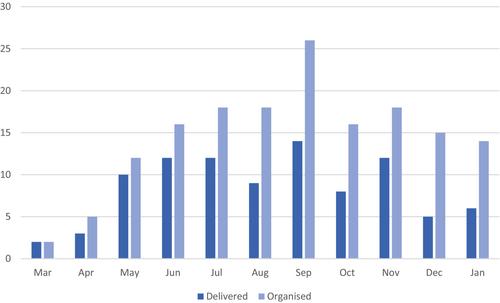Deaths in care homes and “at home” are anticipated to account for a third of UK deaths by 2040. Currently, palliative and end of life care are not part of statutory training in care homes. Reflective practice is a tool that can facilitate practice-based learning and support. Following a feasibly study to test “online” supportive conversations and reflection sessions (OSCaRS) to support care home staff in relation to death/dying during the first months of the COVID pandemic, a one-year practice development follow-up project was undertaken with the aim to create a team of NHS/specialist palliative care (SPC)-based facilitators to lead and support OSCaRS provision in up to 50 care homes in one region in Scotland—the focus of this paper.
Forty care home managers attended an on-line session explaining the project, with a similar session held for 19 NHS/SPC-based nurses external to care homes. Those interested in facilitating OSCaRS then attended three education sessions. Data collected: records of all activities; reflective notes on OSCaRS organised/delivered; a summary of each OSCaRS reflection/learning points; final interviews with NHS/SPC trainee facilitators.
A total of 19 NHS/SPC facilitators delivered one or more OSCaRS in 22 participating care homes. However, as of January 2022 only six trained facilitators remained active. Out of the 158 OSCaRS arranged, 96 took place with a total of 262 staff attending. There were three important aspects that emerged: the role, remit, and resources of NHS/SPC supporting OSCaRS; requirements within care homes for establishing OSCaRS; and, the practice-based learning topics discussed at each OSCaRS.
Attempts to establish a team of NHS/SPC facilitators to lead OSCaRS highlights that end of life care education in care homes does not clearly fall within the contractual remit of either group or risks being missed due to more pressing priorities.



